Escape Rooms Packed Into a Single Deck: A Spoiler Free Review of the Latest Deckscape Games
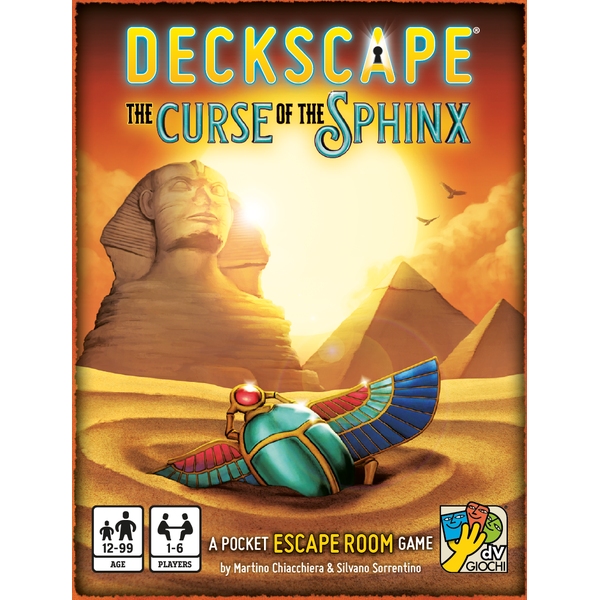
From the waterways of Venice and a magic show full of twists and turns, to the search for El Dorado and the Egyptian desert — four Deckscape releases bring four new widely different themes, stories, and puzzles.
Deckscape is an escape room in a box, with each new game being contained in a single deck of cards. So how does the basic gameplay work? How do the newest releases in the series stack up?
Gameplay
Every Deckscape game has sixty oversized cards, which contain the main core of the game (a couple of the releases also contain an additional object here or there, but the core game is always focused on the deck). The deck is placed in the center of the table and players read aloud the front side of the card that is on top of the deck.
All the rules are written on the cards. The cards tell you when to flip a card over and read the other side. The cards are also all numbered; this allows you to put the game back together in its correct order after you finish, and also you will often be called upon to divide the deck by numbers, so that you will have a handful of smaller stacks. Players can always look at all cards that are currently visible on the table.
Cards will have pictures, usually of a room, item, or puzzle. Puzzles will have a small bit of text, which ask a question. Players can look at the picture on the card and when they think they have the answer to the question, they can flip the card over to check if they’re right. Some puzzles will require players to have found cards depicting certain items in order for them to be able to give the correct answer. If your answer is wrong, you mark the score card with an x. If you need an item for the puzzle that you have not found yet, you will not be able to proceed until you have it, otherwise you continue past the puzzle whether you were correct or not. Players also track their time on the score card.
We have featured this line of games in the past, but four new titles have been released more recently:
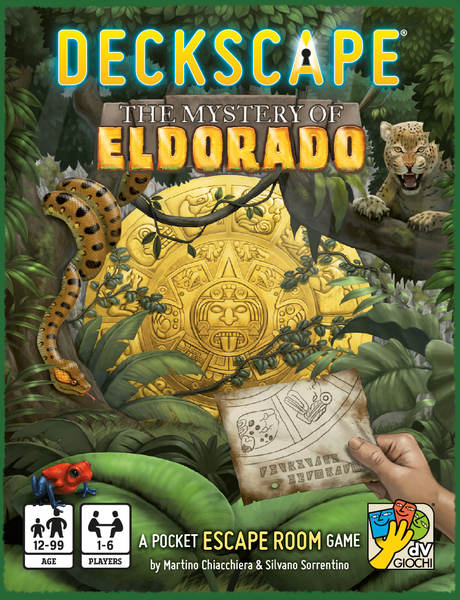
The Mystery of Eldorado
You play as an explorer who has recently given up the search for Eldorado. However, as you fly over the Amazon, on your way home, your airplane is hit and you have to parachute out. Lost in the forest you have one more chance to find the fabled city.
The Mystery of Eldorado introduces a new scoring system to reflect the survival situation, with players being allowed to check two boxes to indicate fatigue before they begin adding x’s to their scoresheet. Additionally, players are presented with various methods throughout the game to remove these fatigue marks.
The puzzles themselves are a little more based on observation and sometimes creative thinking than some of the other games in the series. There is also a clever emphasis on choice in the game, and choosing which items to take from those presented to you on cards. This element of choice gives you the sense of having a unique experience as you play through.
You are typically working on only one or two puzzles at a time, rather than the other games where you often have multiple puzzles on the table at once, which makes it a better game for a smaller group. There’s an additional component included with the game that blends nicely with the story and offers some different puzzle types.
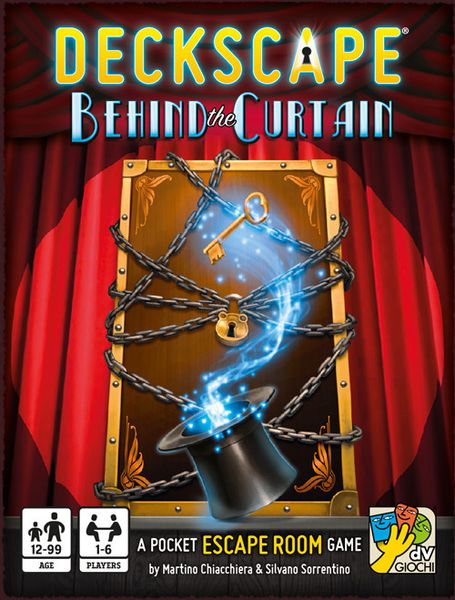
Behind the Curtain
You are invited to attend a famous magician’s magic show. However, you soon find yourself trapped in in his dressing room and searching for a way out.
Some players might miss the more adventurous settings of the other Deckscape games; however, Behind the Curtain does a really good job of blending its theme with the puzzles you encounter. Many of the puzzles are grounded in one way or another in magic, and some of the end-game puzzles are really clever. There is also a neat additional component that allows for some more hands on puzzle solving.
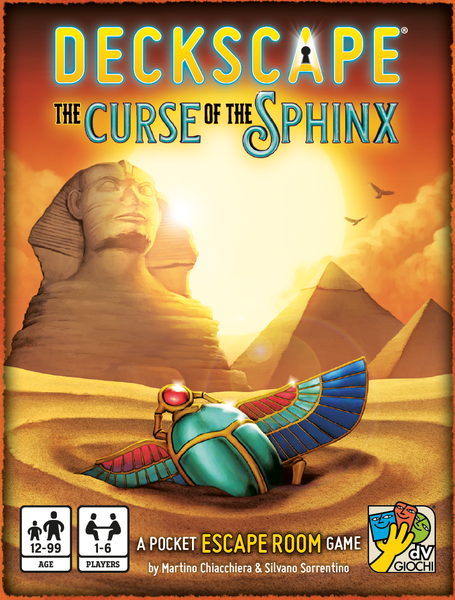
The Curse of the Sphinx
While taking a tour of Giza, you find yourself trapped inside a pyramid! But getting out may be the least of your worries.
The Curse of the Sphinx introduces a new mechanic for when players make mistakes, keeping it highly thematic while also introducing new mini-games and challenges. Some players may find these a bit annoying, and want to just focus on the puzzles, but others will find them an enjoyable addition. It increases the stakes when you make errors (though this can also make the more difficult puzzles more frustrating) and also has an effect on the story.
This game also has one of our favorite logic puzzles of the entire series, a unique ending, and a fun sense of suspense.
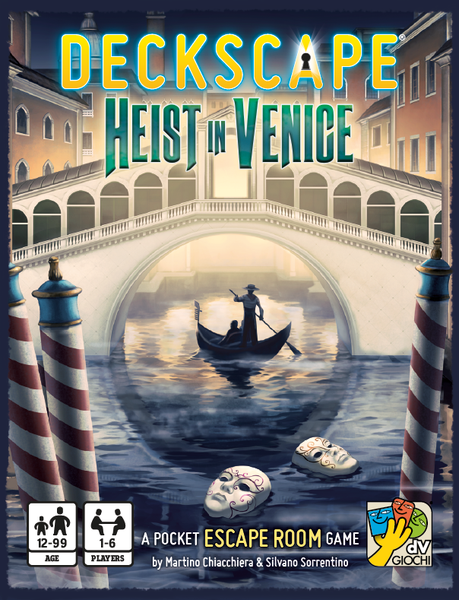
Heist in Venice
Players are retired thieves, blackmailed into pulling one last heist in the city of Venice!
Heist in Venice is unique in the series in that it introduces hidden information. At the beginning, six character cards are revealed and each player chooses one (remaining characters are distributed at random). Having your own character introduces a fun chance for roleplaying if you choose, but each character also has their own skills and knowledge to bring to the heist which they are allowed to talk about with other players, but may not show. This is a great idea as it is a good way to make sure every player feels like they contributed to the puzzles. This also makes Heist of Venice a better game to play with a larger group, and you really miss out if playing solo. Even with two players, the characters feel less special if you’re each controlling three.
The game also has a great sense of humor. None of the Deckscape games take themselves too seriously, but Heist in Venice seemed to have the most fun with its story.
Final Thoughts
The Deckscape games are nicely contained escape room experiences. Puzzles are highly subjective, and what one group finds difficult another may not, but for the most part the puzzles are satisfying and challenging. There was usually one or two we found a bit illogical or frustrating, but again, that is going to vary significantly from group to group and the penalty isn’t huge if you can’t solve a puzzle. Plus, there is always a useful hint system included in each game.
The wide range of themes is neat and it’s great that each entry in the series brings something unique and different than the others. Each one has different strengths (and sometimes weaknesses) and each one has had careful thought put into it. There’s always nice artwork and the stories, while presented quickly so as not to waste too much card space, are still engaging.
If you’re looking for an escape room game, Deckscape is not the flashiest out there nor does it have the snazziest components, but it takes up minimal space, is relatively inexpensive, is portable, doesn’t require an app, and is really easy to pass along to friends and family once you’re done with it.
Pros: wide range of themes with engaging stories, satisfying and challenging puzzles, compact deck of cards, can be passed along to friends to play again
Cons: some illogical or frustrating puzzles (varies from group to group)
Disclosure: we received a complimentary review copy of these games.







